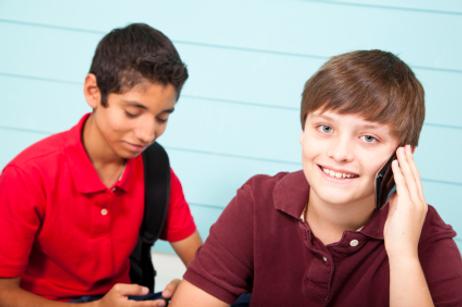Cell phones have traditionally been seen by school districts as distractions that interfere with the learning process. Most instituted bans against the use of cell phones during the school day. However, the advent of smart phones has led some districts to re-explore that decision, and some are now backing away from their bans. Are cell phones and public schools becoming a more amicable union, or are districts merely bowing to student pressure?
History of Cell Phone Bans in Schools
For more than a decade, cell phones and other technology devices have been banned in most public schools across the country. The bans were originally instituted to prevent classroom disruptions and distractions, according to the website for the School Safety and Security Services. As the technology has evolved, concerns have been raised over using the devices to cheat on exams. They have also been seen as a security concern, since phones can now discreetly take photographs of tests or students changing in the school locker room.
Over the years, the use of cell phones in schools has become a matter of debate for students, parents and teachers. Advanced technology has now made phones legitimate instructional tools, as students can now use their phones to access an unlimited amount of information from the Internet. Some have also argued that as cell phones become a more prevalent part of today’s culture, keeping phones out of the classroom prevents schools from moving with the times.
Arguments for Continuing the Ban
And so the debate began. Those who continue to support banning phones from classrooms maintain the issue of disruption to the learning process. WBEZ reports that many Chicago- area school districts will be continuing with cell phone restrictions in schools, despite requests from some principals and parents to allow limited use during the day.
“The policy has been for several years that students are not allowed to have cell phones during the academic day,” Tom Hernandez, a spokesperson for District 202, told WBEZ. “They are supposed to turn them off and put them in their lockers.”
Hernandez added that students do not need their cell phones during classroom time. He explained, “You shouldn’t have that phone because in two minutes you’re going to be in the hallway. You’ll have an opportunity to send your parents a text to let them know that you are doing this or that after school. To send those kinds of messages, you don’t have to do that kind of stuff during the classroom.”
In the New York Times teen magazine Up Front, published on the Scholastic website, the debate over cell phone use in the classroom was put into print. One teacher in favor of a cell phone ban said she saw firsthand how cell phones can negatively impact a student’s academic performance. She asserted that in an emergency, parents would be able to reach their students through the main office of the school and not the student’s cell phone.
According to NBC 4, most public schools in Ohio allow students to have cell phones during the school day. However, use of the phone is determined by individual schools and even individual teachers. Students that continuously violate their school’s policy on cell phones may even fact suspension in some districts.
Support for Cell Phone Use in Class
While many schools are continuing to enforce cell phone bans, others are loosening their restrictions to the delight of both students and parents. One Chicago parent was quoted at WBEZ as saying, “I’m not advocating cell phone use for things like updating your Facebook status, making calls to friends, but what about using cell phones for inputting homework assignments and setting reminders for project deadlines? Do these board members really think that our students are going out to buy planners to keep their appointments and deadlines on track after they graduate?”
Other parents have pointed out that the decision to send children to school with cell phones should be made by parents, not teachers. While most agree teachers should be able to enforce bans within the confines of the classroom, parents believe students should have access to their phones when traveling to and from school. Some also think they should be allowed access at lunch or between class periods.
Some schools in Jefferson County, Kentucky, have found that allowing students more freedom with the cell phones during the school day leads to fewer problems, rather than more. Brad Weston, principal at Fairdale High School, told the Courier-Journal that his school experienced few problems when they spend a few weeks on a cell phone “trial run” at the end of the previous school year.
“During instruction, cell phones were only to be used during instructional activity,” Weston explained. “During common time, such as lunchtime or in between classes, if they wanted to text or use Twitter, they were able to do that. What we found, was since students know they are able to text during common time, they are less apt to do it during instructional time.”
Cell Phones and Security
One other issue has been raised in terms of allowing cell phones in classrooms. After multiple school shooting tragedies, parents have asked school to allow students to carry cell phones in case of an emergency. A phone would allow students to call parents or local authorities for assistance.
However, the National School Safety and Security Services states that overuse of cell phones during a crisis situation can overload the system so that no communication could be made. They might also contribute to an influx of parents to a potentially dangerous scene and perpetuate the spread of rumors and inaccurate information about the situation.
Questions? Contact us on Facebook @publicschoolreview.











